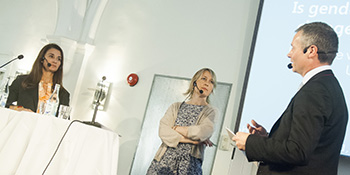gates kuylenstierna modeer

SEI brought together Gates (left) and Ulrika Modéer, Sweden’s State Secretary for International Development Cooperation (centre), in a session that asked if gender equality is a game changer across a range of development challenges.
Gates’ lecture took in the importance of global development goals, the need to empower women and girls to achieve positive change for all, the value of innovative technology, as well as the principles of the Bill & Melinda Gates Foundation and what drives her personally in her work.
The session also featured speed talks and a panel discussion with several high profile guests. Key themes taken up in the session included the Sustainable Development Goals (SDGs), the importance of basic issues like sanitation in empowering women and girls, gender and water resources, how investment in women gives great returns, and how gender equality supports economic growth.
Gender and development goals
On the SDGs, Modéer said, “gender equality is the path to sustainable development. It is clear that we will not achieve sustainable development by doing business as usual.”
“Gender perspectives must be integrated across all sectors, and also visualized in budgets,” she continued.
Gates echoed the importance of global development goals, and how the Millennium Development Goals have made a real difference on the ground, citing her experience with successful community health shops in Ethiopia.
Investment in women and girls
Speaking on investment in women, Gates said that in any programme you carry out, “you’ve got to have women as agents of change – we know that if you invest in a woman or a girl, she invests in everybody else in her family, putting 90% of it back into the family”.
“I don’t see women as recipients of aid, but as economic engines of change”, she continued.
Modéer pointed to a report from the Food and Agriculture Organisation of the United Nations, which found that “closing the gender gap in agriculture alone could lift up to 150 million people out of hunger”.
SEI Research Fellow Caroline Ochieng reinforced the point with a story from a project of her own design that offered credits to women when they chose to get maternal health checks. As a result, not only did maternal mortality drop dramatically but the money was also reinvested in households into education, food and clothing.
“The key lesson from this project is that when you give women the power to make decisions, you have ripple effects in a range of other areas, and this can lesson can be applied in all kinds of different programmes,” said Ochieng.
Need for basic solutions
Speakers agreed that it is basic solutions that underpin women’s efforts to move out of poverty.
WaterAid Chief Executive Cecilia Chatterjee-Martinsen said: “Clean water, safe toilets and hygiene practices mean that women and girls can stay alive, safe and healthy, live in dignity and go to school and be active and productive members of society.”
Modeér said, “Sometimes it’s the most practical solution that’s needed.”
Innovation, technology, and behaviour change
One of the key principles of the Bill & Melinda Gates Foundation is the power of innovation, said Gates, both technological and scientific, but she emphasized the need to learn how to deliver innovations: “We have started to learn and are still learning about behavioural change. Because if for example a woman refuses to take a vaccine, nothing’s going to happen with that innovation.”
Åsa Torkelsson, Economic Empowerment Advisor with the UN Women Regional Office for Eastern and Southern Africa, also reflected on innovation and technology uptake. “There is a mismatch between the many smart innovations that are available, and the real needs of rural women, which is currently not addressed by markets. Why is that? Women need to be empowered to take their place at the table where the rules of the game can be changed.”
Shared partnership
Reflecting on the relationship between Sweden and the Gates Foundation. Gates said of Sweden, “We have an unbelievable shared partnership on so many issues like global health and development where we have very aligned agendas”.
She also pointed to the need for G7 nations to live up to their development commitments at the upcoming Third International Conference on Financing for Development in Addis Ababa in July. “Sweden has led on the 0.7% of GNI that is going to development assistance, actually giving over 1% of your GNI to ODA, and we use that to go to other governments and say that’s the right thing to do.”
Gates also expressed interest in Sweden’s new “feminist foreign policy”, which Modeér outlined earlier in the session.
Design and development by Soapbox.
